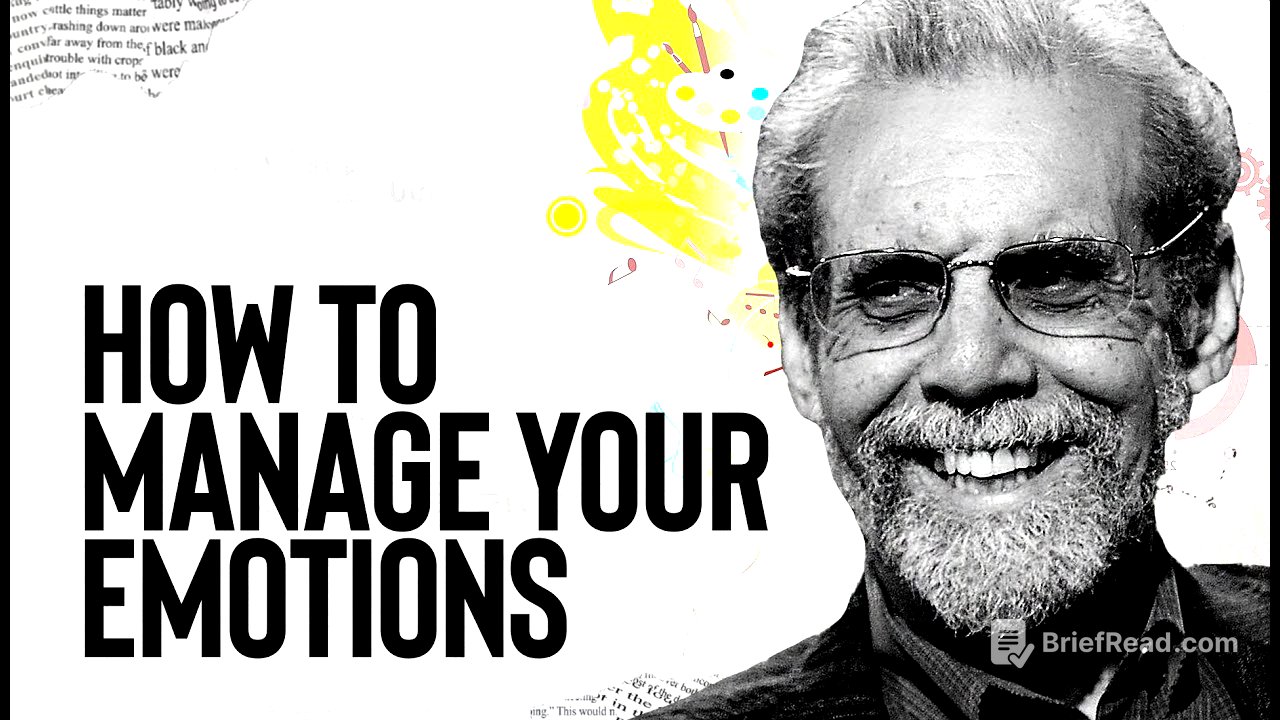TLDR;
In this episode of Future Ready Leadership, Jacob Morgan interviews Daniel Goleman, the "father of emotional intelligence," about the crucial role of emotional intelligence in leadership. They discuss the definition of emotional intelligence, whether it's genetic or learned, its impact on leadership, and practical methods for managing emotions in the workplace. Goleman emphasizes that emotional intelligence is a key differentiator for outstanding leaders, affecting team performance and overall organizational success.
- Emotional intelligence is crucial for effective leadership and can be learned and improved through feedback and practice.
- Leaders' emotional states are contagious, impacting team performance positively or negatively.
- Managing negative emotions involves techniques like breathing exercises, naming the emotion, and mindfulness practices.
Intro [0:00]
Jacob Morgan introduces Daniel Goleman, a renowned psychologist and author known as the "father of emotional intelligence." Goleman's work includes best-selling books such as "Emotional Intelligence," "Social Intelligence," and "Primal Leadership." The discussion will focus on emotional intelligence and its relevance to leadership in the modern workplace.
Daniel’s background and how he got involved with emotional intelligence [1:58]
Daniel Goleman shares his background, starting with a Ph.D. in psychology from Harvard and transitioning to a science journalist at The New York Times. During the "Decade of the Brain," he covered new discoveries about emotions in the brain. Goleman clarifies that he popularized the term "emotional intelligence," which was initially coined by Peter Salovey (now the president of Yale University) and John Mayer. He recognized the phrase's significance and used it as the framework for his book, which became a global bestseller. This led him to work with companies, organizations, and schools, promoting social-emotional learning (SEL) for children, emphasizing self-awareness, self-management, empathy, and social skills. Goleman notes that emotions are always present and influence behavior, making emotional intelligence highly relevant in all aspects of life.
What is leadership and what does it mean to be a leader [5:05]
Daniel Goleman defines leadership as having a sphere of influence, suggesting that everyone is a leader in some capacity, whether within their family, among friends, or in a formal organizational role. Leadership effectiveness hinges on whether people listen, respect, and are guided by an individual's words and actions. Thus, leadership is applicable across all areas of life.
What is emotional intelligence [5:40]
Goleman explains that emotional intelligence comprises a set of competencies that distinguish outstanding performers in the workplace. These competencies, numbering around a dozen, fall within the domain of emotional intelligence and can be learned. Emotional intelligence sets the best leaders apart, even in fields like engineering, where it has been shown to correlate more strongly with effectiveness than IQ.
Is emotional intelligence something you learn or is it genetic [7:42]
Daniel Goleman asserts that emotional intelligence is primarily learned and learnable, cautioning against over-reliance on genetic tests like 23andMe. While genetics provide a starting point, life experiences and feedback are crucial for developing emotional intelligence, particularly empathy. Real-time feedback helps individuals understand the accuracy of their assumptions about others' feelings, leading to improvement.
What emotional intelligence does for us [10:48]
Emotional intelligence involves managing all emotions, including negative ones like anger, disgust, and sadness. Being in a negative emotional state narrows cognitive abilities due to how the brain is wired. Emotional intelligence helps manage disturbing emotions and encourages positive emotions and an optimistic outlook, fostering a growth mindset. It enables individuals to stay focused on goals, adapt, and remain agile. Leaders must first manage their inner lives to lead others effectively, tuning into them with empathy. A leader's emotional state is contagious, affecting the emotions and performance of those around them.
Should leaders always be positive, even if they are feeling upset or frustrated [13:32]
Authenticity is key for leaders. Faking positivity can be easily sensed by others. It's better to clear the air by acknowledging negative emotions. Naming a negative emotion shifts energy to the prefrontal cortex, aiding in emotional management. The brain is wired to read emotions from facial expressions, such as distinguishing a genuine smile (with crow's feet) from a fake one.
How emotional intelligence manifests in an individual [16:40]
Emotional intelligence manifests through various competencies in outstanding leaders and performers. Self-management includes handling disturbing emotions and fostering positive ones, along with adaptability, positivity, and focus on long-term goals. Empathy enables good teamwork, effective influence, and constructive feedback. Inspiring others by articulating a shared sense of meaning and handling conflicts are also crucial. No single leader excels at all competencies; individuals have different strengths. Assessments like the emotional social competence inventory can provide feedback for personal development.
Why do we need emotional intelligence? [20:09]
Emotional intelligence is essential because many individuals are promoted to leadership positions based on task proficiency, often neglecting the human element. This can lead to disengagement and high turnover, as people leave due to poor relationships with their bosses. While cognitive ability is necessary, emotional intelligence is crucial for working effectively with others. Executives recognize the importance of emotional intelligence for leadership, while new hires often prioritize technical skills, indicating a learning curve in understanding its value.
Three methods to manage your emotions in the workplace [27:32]
Daniel Goleman provides three methods for managing emotions in the workplace. First, a breathing technique involves inhaling deeply for a count of four, holding for four, and exhaling slowly, repeated six to nine times to shift from sympathetic to parasympathetic nervous system arousal. Second, naming the emotion helps shift energy from the feeling part of the brain to the managing part. Third, mindfulness practice, such as breath meditation, strengthens the brain's ability to manage negative emotions and enhances focus. A simple breath meditation involves focusing on the full in-breath and out-breath, bringing attention back when the mind wanders. Additionally, cognitive therapy suggests not believing every thought, especially catastrophizing ones, and challenging negative self-talk.
What do you do if you work for a leader who is not emotionally intelligent [40:49]
If working for a leader who lacks emotional intelligence, avoid directly telling them they have no EQ, as it can backfire. Instead, seek an ally who can influence the boss or, as a last resort, consider finding a new job. If you have a good relationship with your boss, you might suggest improvements tactfully.
How to create an emotionally intelligent organization [43:23]
Creating an emotionally intelligent organization involves developing emotional intelligence in people. Methodologies include coaching and learning teams. Key steps are ensuring individuals care about developing their emotional intelligence, obtaining a good evaluation through feedback, working with a coach or learning partner, and practicing at every opportunity. Proven methodologies include coaching and learning teams, while ineffective approaches include brief, unsupported training sessions. Signs of emotional intelligence include likeability, the ability to manage negative emotions, awareness of how others perceive them, and making others feel seen and heard.









